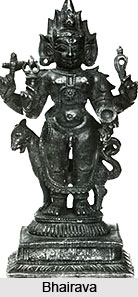 Bhairava is an incarnation of Lord Shiva, who is often shown nude, with a third eye, long teeth and hair of flames. He can often be seen wearing jewellery of snakes, and a garland of skulls, which is here, stylized into a garland of flowers.
Bhairava is an incarnation of Lord Shiva, who is often shown nude, with a third eye, long teeth and hair of flames. He can often be seen wearing jewellery of snakes, and a garland of skulls, which is here, stylized into a garland of flowers.
Bhairava is shown having left arms holding a snake (naga) and trident (trishula) and right arms holding a noose (pasha) and cup (kapala) in the illustrations. He is also shown standing with his dog vehicle (vahana) behind him. The deity Bhairava has several other forms in which he is represented having five heads and ten arms. He has few similarities with the Buddhist Mahakala as some forms of him also carry a noose. Both of them also serve the protector function. Bhairava worked as a door guardian (duarapala) and he is also known as Kshetrapala while Mahakala worked as a faith guardian (dharmapala). Both these individuals emerged late in the development of Indian iconography. Again these two arose at the time when Tantrism had started to affect both religions, particularly the cult of Shiva.
Bhairava was more related to tantras, who interpreted the essentially secret rituals described in the texts. He was involved in worshipping of the female deities and thus a group of 64 female ascetics (yoginis) was developed. These yoginis are again seen to have taken a male consort known as Bhairava in many iconographies.



















